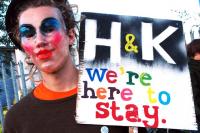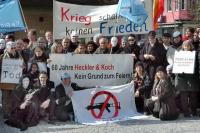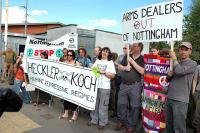Last month, some members of the 'Nottingham UK Shut Down Heckler & Koch Campaign' travelled to Germany. Together with German Peace Groups, we wished to pre-empt the company’s 60th birthday celebrations.
Here in Nottingham, the campaign holds regular monthly demonstrations outside their offices at Easter Park, Lenton Lane, Nottingham NG7 PX. These will continue with a picket on Tuesday April 14th and a special campaign anniversary demo on Monday May 11th [with a mystery guest!].
Heckler & Koch's UK office is NSAF Ltd, Unit 3, Easter Park, Lenton Lane, Nottingham NG7 2PX. Map Google 'Street View'.
Previous Feature:
Protesters Target Nottingham Weapons Manufacturers
Newswire:
Demos continue at Heckler & Koch weapons HQ
[July 2007] | [May 2008] | Surveillance at Heckler & Koch weapons HQ [May 2008] | [July 2008] | Pix 1 [Oct 2008] | Pix 2 [Oct 2008] | Surveillance at Heckler & Koch weapons HQ [Nov 2008] | Full Circle: From weapons to wars to refugees. Market Sq. Nottingham [Dec 2008] | [Dec 2008] | [Jan 2009] | German Indymedia: Weitere Proteste gegen Heckler & Koch | Demo about Heckler & Koch weapons activities, Market Square [Jan 2009] | [Feb 2009] | Nottingham Campaigners to Visit Germany
Nottingham Campaigners to Visit Germany, press release in PDF | [1] Freiburg Peace Group | [2] Rottweil Peace Meeting | [3] Oberndorf Demo | [4] Oberndorf Demo | [5] KTS Social Centre Freiburg | [6] Misc pictures of German visit
Links:
Notts Shut Down Heckler & Koch Campaign | Notts Anti-Militarism | Nottingham Stop The War | Nottingham Student Peace Movement | RüstungsInformationsBüro RIB | Ohne Rüstung Leben | Deutsche Friedensgesellschaft - Vereinigte KriegsdienstgegnerInnen DFG-VK | Notts Indymedia (anti-militarism)
Audio:
H&K German Mission [Speech at Rottweil]
Flyer:
Poster / Flyer PDF of H&K leaflet
*****
Heckler & Koch is the world's second-largest manufacturer of handguns, assault rifles, submachine guns, machine guns and grenade launchers. Their UK HQ is an anonymous unit on an industrial park off Lenton Lane, NG7. It is responsible for selling guns around the world. Half a million people are killed by small arms each year, three quarters of whom are civilians. Literally millions of Heckler & Koch small arms are in use in around 90 countries. Heckler & Koch has licensed its weapons for production by repressive regimes such as Turkey, Iran, Mexico, Thailand, Pakistan, Saudi Arabia and Myanmar. Beyond the reach of EU arms embargoes, these countries have supplied the weapons to conflict zones such as Indonesia, Kenya and Sri Lanka.
H&K guns have been used in wars in Bosnia, East Timor and Sudan. The Heckler & Koch G3 rifle has been used by the often murderous militaries of Bolivia, Brazil, Chile, Colombia, El Salvador, Guyana, Haiti, Papua New Guinea, Paraguay, and Peru. These examples illustrate the unethical and uncontrolled nature of the industry in which Heckler & Koch is proud to operate.
H&K also supplies military and police units across Europe and the USA. The police team that slaughtered Jean Charles de Menezes on a London tube train was armed with powerful Heckler & Koch assault weapons.
Demo at German HQ of Nottingham arms company
Four activists from Nottingham traveled to Germany to take part in a demonstration against arms company Heckler & Koch at the company’s international HQ in March. H&K is one of the world’s largest manufacturers of small arms, and its guns are used throughout the world; from Darfur to Iraq, from Nigeria to Nepal. The company has long been opposed by peace campaigners in Germany, and since 2008 its Nottingham office has been the target of a local campaign called Shut Down H&K.
In 2009 Heckler & Koch will be 60 years old. In order to pre-empt the company’s birthday celebrations, German peace groups organised a protest with the slogan 60 Jahre Heckler & Koch: kein Grund zum Feiern (60 Years of Heckler & Koch: No Cause for Celebration). The Nottingham activists were invited to a March 7th demonstration by the peace groups RIB, ORL and DFG-VK, who also funded their journey.
In Germany, the damning case against Heckler & Koch was laid out in a lecture by the country’s leading anti-arms-trade campaigner Jürgen Grässlin. Speaking on the eve of the demonstration at a hall in the town of Rottweil, Grässlin talked about H&K’s history of arming repressive regimes. He showed the audience slides of H&K rifles in the hands of genocidal militias, and presented a pair of flip-flops he had taken from a Sudanese mass grave of people executed with H&K guns.
Then it was the turn of the Nottingham delegation to speak about their campaign and how H&K has used its UK operation to evade arms embargoes and supply guns that were used in human rights abuses in countries like Bosnia, Sudan, Ecuador and Indonesia. The German audience was genuinely shocked to hear about the tactics used by Nottinghamshire Police to supress the campaign.
Heckler & Koch’s global HQ is in the picturesque South-West German town of Oberndorf am Neckar, far from the misery inflicted by its trade. The theme of the demonstration was Maskerade des Todes (Masquerade of the Dead) signifying the estimated 1.5 million people who have been killed by H&K weapons. Some 200 demonstrators gathered at the railway station in the midday sunshine and listened to music and speeches before setting off on a march into the town centre.
Many of the marchers were dressed all in black, their faces covered by white deathmasks. Some bore crosses with the names of countries in which people have been killed with H&K weapons, while others carried signs saying “I am a soft target” – a reference to the euphemistic description of human beings in H&K’s marketing brochures. Still more marchers were dressed as soldiers, arms industry execs or bankers, and a lone clown played the funeral drum.
The marchers gathered around a cobbled square and watched as a piece of street theatre played out before them. First the board of H&K toasted their booming business with champagne and then none other than Death himself took centre stage, praising H&K – his favourite company – for sending him so many souls. The Grim Reaper personally congratulated the CEO of H&K, who offered to replace his ageing scythe with a more efficient, modern tool – a Heckler & Koch assault rifle. Death was pleased!
Next Jürgen Grässlin delivered a powerful denunciation of Heckler & Koch, listing the company’s many shameful dealings – a history that gives no cause for celebration. Finally the Nottingam delegation stepped up to speak, thanking the German campaigners for inviting them, and delivering the message that opposition to the arms trade must be as global as the arms trade itself. In an overwhelming show of solidarity, the German campaigners had an impromptu whip-round that raised €270 for the UK campaign.
The British activists were struck by the differences between this demonstration and the demos against H&K in Nottingham. First of all, the police presence was nowhere near as oppressive. There were about half a dozen German police who maintained a respectful distance, and very little police surveillance. By contrast, every Nottingham picket has been attended by numerous riot vans with at least one policeperson for every demonstrator, and constant and oppressive surveillance, despite the fact that these demonstrations have always been peaceful.
The second difference is that the Heckler & Koch HQ in Oberndorf is well signposted, as opposed to the Nottingham depot, which is completely unsignposted, hidden in an unmarked warehouse as if ashamed of its business.
The demonstration was reported favourably on German TV news and in local newspapers and was filmed for a documentary about Grässlin. The collaboration between the German and British campaigns has been a boost for both, and they will continue to work together in a spirit of international solidarity against the arms trade.
*****
transcript of speech delivered by Shut Down H&K at 60 years OF Heckler & Koch: No Cause For Celebration)
Adolph-Kolping Gemeindehaus, Waldtorstraße 8, 78628 Rottweil, Germany
Hello, greetings from Great Britain. First of all I would like to thank RIB and ORL and DFG-VK; all the peace groups who have invited us and whose financial help has made it possible for us to be here today. We’ve travelled from Nottingham, a small city in the middle of England, and I want to tell you about our campaign against Heckler & Koch, but first, a bit of history.
The Royal Ordnance Factory in Nottingham produced artillery guns and shells for World Wars I and II. In 1969 Heckler & Koch made one of its infamous licensed production deals with Royal Ordnance in the UK so that where Heckler & Koch was restricted by the German Federal Government from exporting, the Royal Ordnance could make the weapons under license and ship them, thereby getting around German export restrictions. Hundreds of thousands of these weapons were supplied to countries that the German government did not allow Heckler & Koch to deal with such as in the 70s Nigeria and Kenya, and in the 80s Sudan.
In 1987, the privatised Royal Ordnance was sold to Britain’s largest arms company, British Aerospace, and a new Small Arms Facility was built in Nottingham. One of its first jobs was to make MP5 submachine guns that later turned up in the Bosnian war. In 1991 British Aerospace acquired Heckler & Koch, which then took over the Nottingham Small Arms Facility and continued using it to evade German export restrictions, producing weapons that were used in human rights violations in Ecuador and Indonesia.
Between 1998 and 2000, Turkey was licensed to produce 600 000 Heckler & Koch assault rifles, despite the country’s well-known military oppression of its Kurdish minority. So in May 2000, eleven people staged the first demonstration against Heckler & Koch in Great Britain, leafleting workers at the Royal Ordnance Factory in Nottingham.
In 2002, British Aerospace, now called BAE Systems, sold Heckler & Koch to private investors. The Royal Ordnance Factory in Nottingham was closed down, but Heckler & Koch stayed in Nottingham. They tried to keep their new location secret, but it was rediscovered by anti-arms-trade activists in 2007.
A little investigation revealed that an unsignposted warehouse near to the University Hospital was being used as an international sales office and distribution depot. No signs, no address publicly available. We weren’t sure that it was them. So we decided to go and pay them a visit. From the outset it was clear that the police were very protective of Heckler & Koch. Five minutes after I buzzed on the intercom and asked “Is that Heckler & Koch?” three police cars arrived, I was surrounded by officers, some of them armed, and when I refused to tell them what I was doing there, they threatened to arrest me under the Terrorism Act. That was when we knew we had found Heckler & Koch.
We decided to get some people together, and using our local social centre as a base, we organised a demonstration. So the next time we went back to Heckler & Koch, we went back with 40 people with banners and placards and megaphones and flyers, and we were met at the gates of Heckler & Koch by the same number of police, some mounted on horseback. The company closed down for the afternoon.
Nottingham has had problems with gun crime and a lot of Nottingham people we believe would be outraged to learn of the presence of Heckler & Koch in the city. But nobody knows about it – it’s a secret. So with this in mind we sent out press releases. Local newspapers, radio and TV were interested, interviews were arranged, photographers were booked. And then before publication, media outlets suddenly started to drop the story.
It was the same when we organised a large demonstration the following year. We turned up with 70 people; once again we tried to get media coverage. And this we found out is what was happening behind the scenes: When reporters from the newspapers or TV or radio phoned up Heckler & Koch to ask for a statement or comment on what they thought about the demonstration, the man on the phone said “We will tell you nothing, and we advise you to talk to your editor before you run this story.”
Then within ten minutes, the media outlets received phone calls from Nottinghamshire police, warning them that it would be “irresponsible” for them to reveal the location of Heckler & Koch in Nottingham. But they failed to stop all the coverage, and we were reported in local newspaper, radio and TV and through the independent media network Indymedia.
And we’re not going away. Since May 2008 we’ve had monthly pickets outside Heckler & Koch. We’ve investigated trying to get the company evicted, and we’re now going to be also campaigning against the landlord of Heckler & Koch. We distributed thousands of leaflets to the people of Nottingham, who are always shocked to learn of the arms company’s presence, and we are challenging the police censorship of the media.
Some people ask us what’s the point of this campaign? The company Heckler & Koch is too big and powerful, and if you shut down this factory, they will just open another one somewhere else, maybe somewhere else in Britain, somewhere else in another country.
My answer is this: Just by pursuing our campaign, we are raising public awareness, about Heckler & Koch and about the small arms industry in general. This bad publicity could lead to reduced investment and loss of profit, as it has done with other arms companies that have been targeted by similar campaigns in the UK. Public scrutiny could lead to tighter regulation of arms exports. And closing the Nottingham office would be a serious blow to Heckler & Koch, disrupting their operations, costing them dearly and rallying anti-arms-trade campaigners elsewhere. If the company opens a new facility elsewhere then it must be opposed there too, and that is the key. The arms industry is global and so opposition to the arms industry needs to be global as well. And that is why we’ve travelled from Nottingham to be here this weekend.
Thank you.



